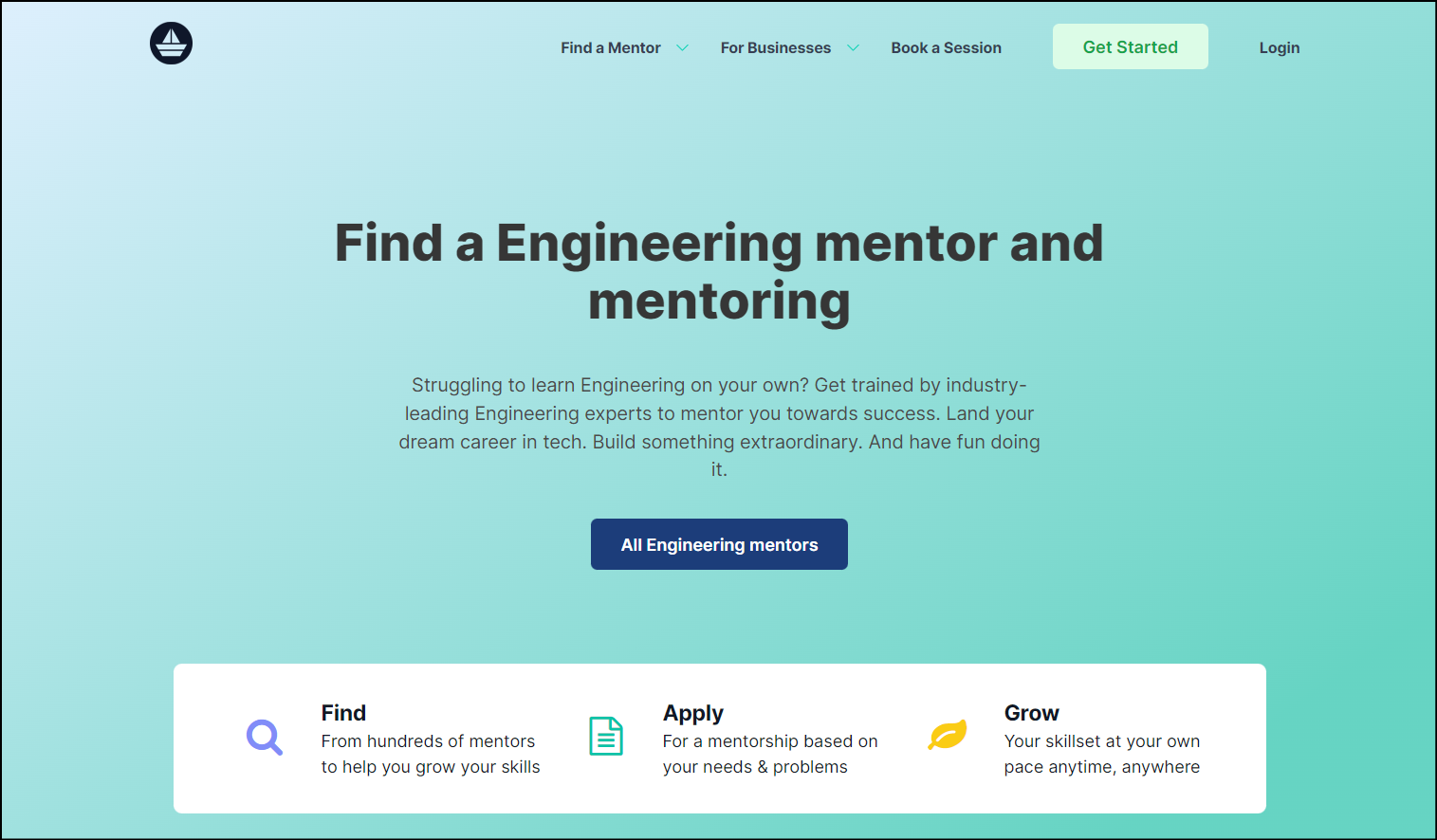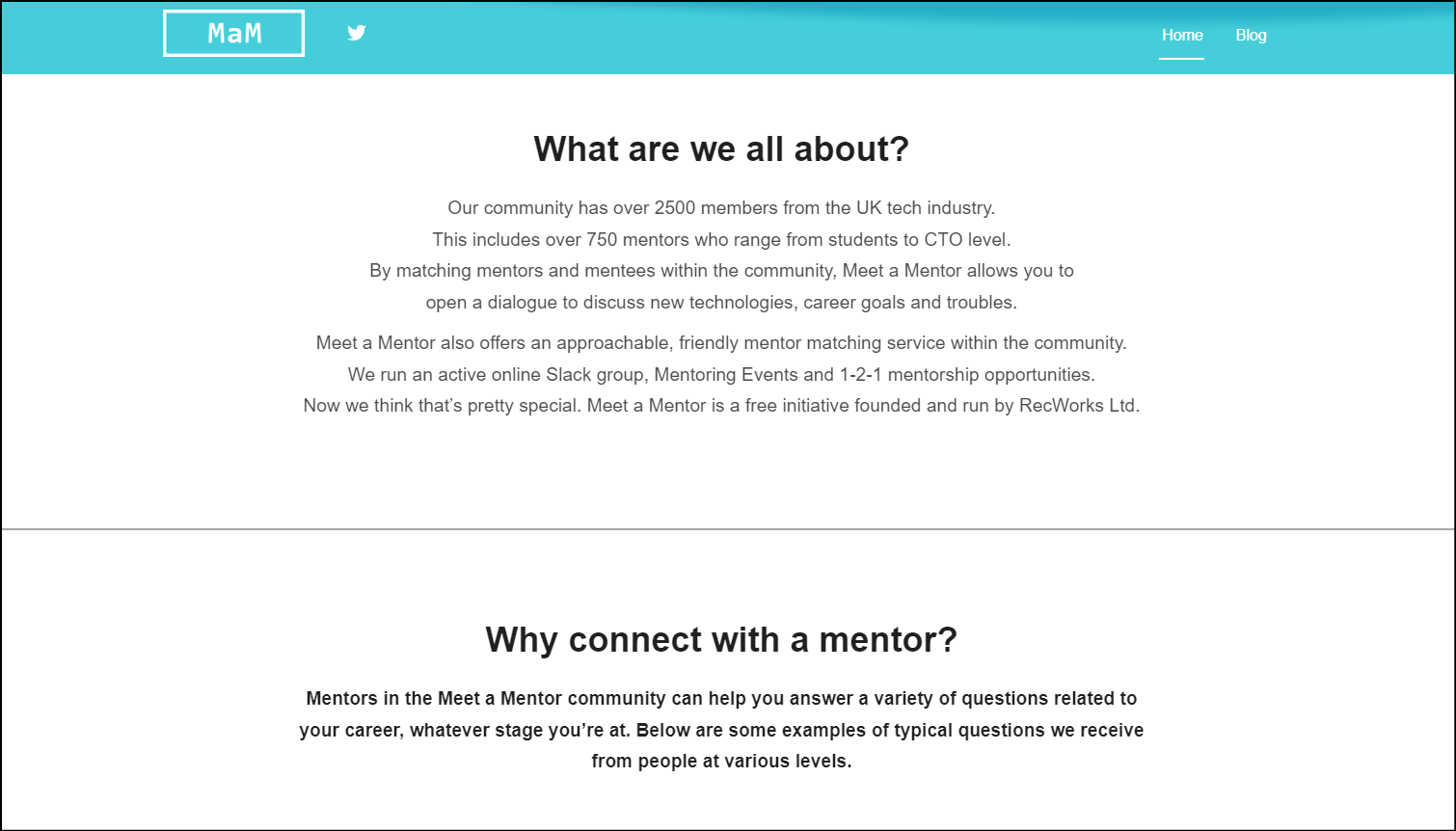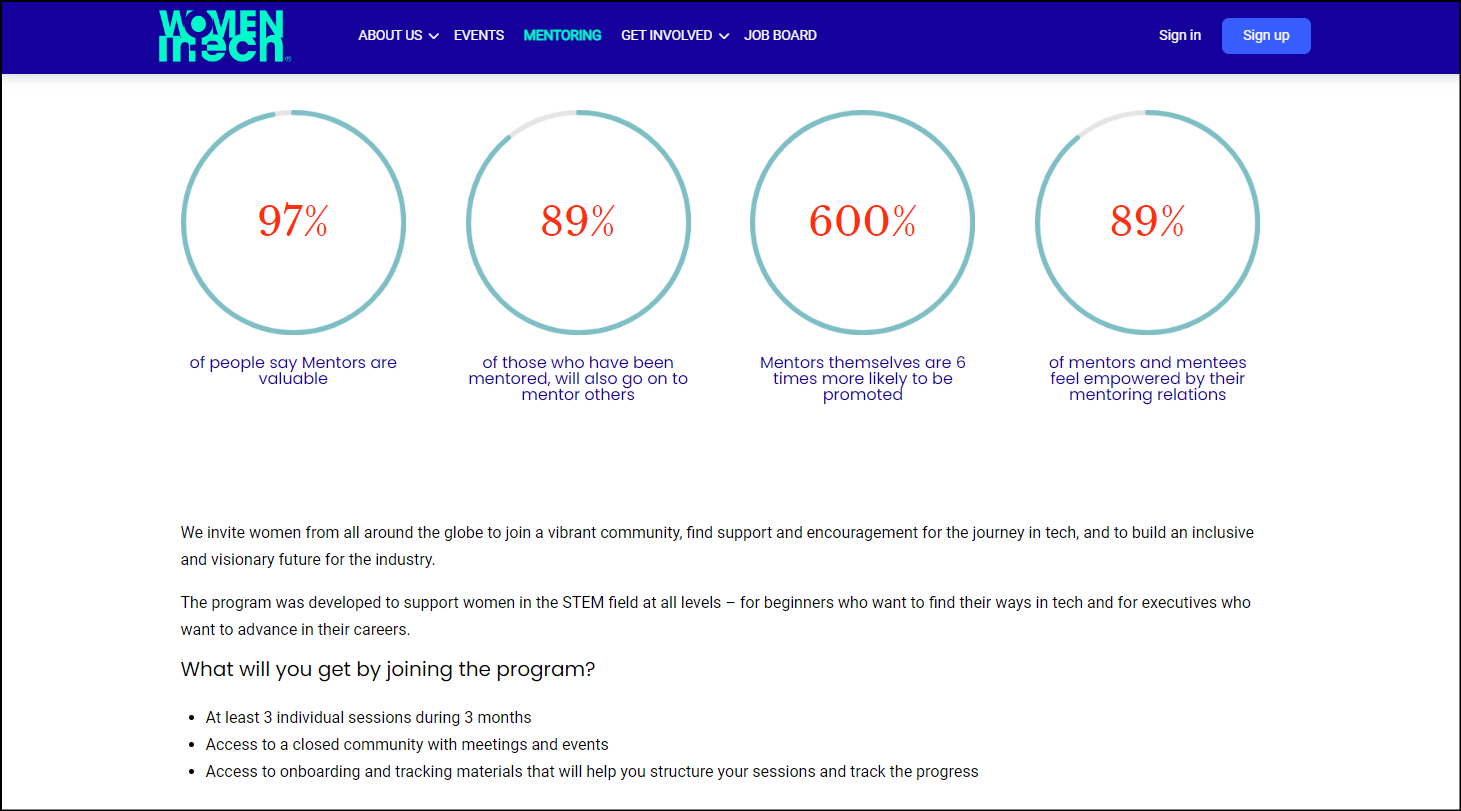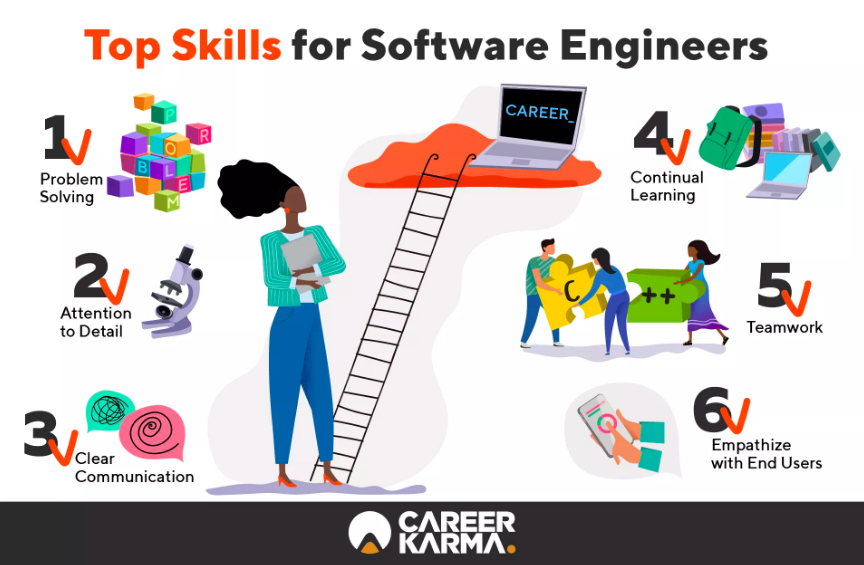How To Grow Your Career With a Software Engineering Mentor

In this article
When it comes to career advice and training, blogs and YouTube videos can only get you so far. If you’re in the early stages of your software engineering career, it won’t be long before you hit a problem that requires a real, personal, human response—but in those situations, who do you turn to?
A software engineering mentor can fill this role, and provide less experienced developers with advice and insight that has taken many years to cultivate. To help you learn more, we’ve put together a detailed guide on mentorships, where to find them, and how to ensure you have a rewarding experience.
What Are the Advantages of Having a Software Engineering Mentor?
Mentors provide guidance and support as you navigate the early stage of your career, and help you avoid common pitfalls and mistakes. They can help you develop your skills and meta-knowledge of the industry, as well as introduce you to new people to help build your network and lay a foundation for future opportunities. Essentially, having a software engineering mentor gives you access to information gained only through expertise and experience.
How Can You Find a Software Engineering Mentor?

When searching for a mentor, keep in mind that not every mentorship is formal and official. While some people may be officially assigned a formal mentor at their workplace, others might meet a senior developer online who fills the role but never explicitly agrees to mentor them.
Both types of mentorship are completely acceptable and equally beneficial, so you don’t need to stress too much over titles and formalities. Here’s a list of potential places you could find a mentor.
Workplace
If you already have an entry-level software engineering job, the first place you should look is within your own company. Many tech companies have official mentoring programs that pair senior engineer mentors with more juniors engineers, so ask around and find out what your company offers.
If there isn’t an official mentorship program, don’t be disheartened. Mentorship is a respected and valued part of training new engineers, and most of your experienced colleagues will have benefitted from it themselves when they were juniors. This means that lots of people will be open to the prospect of being a mentor themselves or helping you find someone suitable.
Bootcamps With Mentorship
Alternatively, if you’re just starting out as an engineer and want to benefit from mentorship during your education and training, enrolling in a bootcamp with 1:1 mentorship could be perfect for you. With Springboard’s Software Engineering Career Track, you’ll be assigned a personal mentor to have 1:1 calls with throughout the duration of your course.
As an industry expert and experienced engineer, your mentor will be able to help you with technical questions and provide insight into the day-to-day life of a software engineer. Working with a professional this early in your training can create a great student experience and provide you with a competitive edge as you search for your first job after graduation.
Utilize Your Network
Another way to find potential mentor candidates is to consider the people you’re already acquainted with. If you’ve already spent some time being active in the industry, you’ll have met plenty of people that might be able to help you out. Here are some good ways to connect:
Using LinkedIn to reach out to engineers that you respect is a great way to start a lasting mentor relationship. When approaching someone, think about their strengths and the work they do that you’re interested in, so you can pose questions and be specific about what you’d like to learn from them. This is more likely to earn a favorable response than starting by asking someone, “Will you be my mentor?”
Online Communities
From Slack and Discord servers to subreddits and forums, there are endless online communities to participate in as a software engineer. These communities are populated with everyone from amateur enthusiasts to the most senior of seniors, and they’re all there because they enjoy sharing and discussing their work.
This makes online communities a great place to find informal mentoring, and even if the relationship remains completely online, you can still reap all of the same benefits.
Industry Conferences
Attending conferences is a great way to meet active and passionate members of the engineering community, and the kind of people who make the best mentors. In-person events are better for networking than their online counterparts, but it’s best to attend everything you can for the best chances.
Hackathons
Hackathons can also take place both online and on-site, but in this case, either works well. These events are about working with other participants to work on a new idea in a short space of time, so both online and in-person versions involve collaboration.
You can develop lasting relationships with the people you work with, and hopefully, find a senior engineer that can provide you with informal mentorship.
Dedicated Mentorship Websites and Opportunities
It’s also possible to choose a mentor from a pool of people who have already signed up for the job. People who want to share their skills and experience can sign up for the following programs and get assigned to mentees all over the world.
MentorCruise

MentorCruise is essentially like an online tutoring agency but for mentors. Experienced professionals sign up, create a profile, and set a price for their services. As a mentee, you can search through the site to find potential mentors in your field and with specializations you’re interested in, and pay the fee to begin your mentorship.
Meet-a-Mentor

There are also free mentoring sites available like Meet-a-Mentor, where mentees and mentors are matched together and introduced through Slack. The site only focuses on introducing people to each other, so it’s up to you to make the introduction count and turn it into a lasting correspondence.
Women in Tech®

This is a paid formal mentorship program aimed specifically at women in the tech industry and consists of a three-month mentorship with an experienced mentor in your field. It covers multiple areas of expertise, including career and leadership skills, software development, digital marketing, project and product management, business analytics, and UX/UI design.
Professional Associations
Joining a professional association can have various benefits for your career, but it’s also a great place to meet other engineers. Many associations have online communities for their members and offline networking events that allow people to meet and connect with others in their field of work.
Cold Outreach
This tactic can require more luck than others, but it is also possible to reach out to people you’re not already acquainted with. You might read a blog by an experienced engineer, or follow someone talented on social media, or even have a favorite author or well-known figure within the industry.
By sending them an email or message over social media, there’s a chance that they’ll answer your questions and help you out.
What Skills Can a Software Engineering Mentor Help You Hone?

The short answer is: all of them. From coding skills to career-building skills, the experience mentors share can help you in just about any area. Let’s break down what that looks like:
Technical Skills
As a software engineer, your skills and knowledge will continue to grow as you contribute to more projects. A successful technical mentorship will point a junior in the right direction as they learn what kind of skills and areas to prioritize. What juniors assume is important and what seniors believe is important can be two very different things, so an experienced opinion can be very beneficial.
Get To Know Other Software Engineering Students
Abdelkareem ElSharief
Software Engineer at Bread
Geraldo Gomes
Software Engineer at Affirm
Matthew Dillon
Front End Developer at LaunchBadge
Soft Skills
Soft skills include interpersonal relationships, communication, self-development, and leadership skills. A mentor can help teach you what kinds of connections to build, how to present and sell yourself, and what kinds of opportunities to take in order to grow your career path and be a part of projects you’re passionate about.
Tips To Make the Most of Your Software Engineering Mentorship

A mentorship isn’t guaranteed to be successful, and you won’t be able to reap the benefits without putting in the effort. Here are some things to think about to make sure you get the best out of your mentorship:
Decide on a Goal at the Start of the Mentorship Journey
Mentorships don’t have to be a career-long relationship, in fact, many are fixed-term arrangements that benefit from having a concrete goal to work towards. This could be completing a project, developing a specific skill, or learning about a new area.
Don’t Shy Away From Asking Questions
Asking questions is a big part of having a mentor. That being said, not all questions are a good use of your mentor’s time. For technical subjects, don’t decide to ask about something before you’ve researched it or tried to come up with an answer on your own. Even with non-technical questions, put some thought into the topic first so you can ask a clear and insightful question.
Take Notes
If you’re having a meeting over a call or in person, make sure to take notes where relevant. This will help you learn from the higher level topics you discuss, and avoid asking your mentor to repeat themselves.
Request Your Mentor To Review Your Projects
If you’re interested in developing your technical skill set, having your mentor do a code review of a project is one of the best ways to get an honest opinion of your work. Your mentor will be able to learn a lot about your level and your coding style by looking at how you approach a project, design systems, and deal with problems. This works best when the project reflects your true level, rather than following a tutorial or getting help from somewhere else.
Be Vulnerable and Share Your Struggles
Most hurdles and struggles you might be facing as a junior developer will be common to the field and experienced by many other engineers as well. By sharing your thoughts on this topic, you might find your mentor has some useful advice, insights, or even personal experience on the matter.
That’s not to say, however, that you should spend your time complaining. If you voice a concern and your mentor offers a potential solution to try, it’s best to give it a go and get back to them later, rather than express doubt or explain why you think it won’t work.
Show Initiative and Be Receptive to Feedback
Showing initiative is essential during a mentorship. Your mentor may be the more experienced engineer, but that doesn’t mean they should be the one arranging meetings, suggesting topics, and leading the conversations.
It’s also important to be open to feedback. This means accepting criticism and working on it, rather than rejecting your mentor’s opinion or becoming defensive. Whatever advice or tips for improvement they might give, it’s always better to try them out before making a judgment.
Respect Your Mentor and Their Expertise
Just because someone is a mentor doesn’t mean they are automatically correct about everything. However, as a junior, you’re unlikely to understand every piece of advice your mentor gives you. After all, if you could come to all the same conclusions and answers as they do, you wouldn’t need them in the first place.
Considering the large gap in experience and expertise, it makes sense to accept and test your mentor’s suggestions before assuming that you’re right and they’re wrong. This is what it means to respect your mentor and their expertise, and it will help you learn new things as well as maintain a good mentoring relationship.
Give and Take: Consider How You Can Help Your Mentor
This doesn’t mean you need to find something you know and your mentor doesn’t so you can teach them, but rather, be open to requests your mentor might make. If you put effort into your mentorship, it will automatically be a beneficial experience for your mentor as well, so this is the best place to focus your efforts.
Remember: It’s Your Job To Make the Most of Your Mentorship
Don’t expect all of the work to be done for you. As a mentee, you need to approach your mentor for calls and sessions, present ideas and projects, ask for code reviews and feedback, and prepare insightful questions.
FAQs About Software Engineering Mentorship
We’ve got the answers to your most frequently asked questions:
What Should I Look for When Choosing a Software Engineering Mentor?
The best mentor is someone whose work interests you. If you’re working towards a certain specialization, it’s also good to choose someone who does the kind of work you want to do one day too.
Is Hiring a Software Engineering Mentor Worth It?
Paying for a mentor can be expensive, so it depends on how much you’re willing to spend. Hiring a mentor for a specific short-term goal like going over a project can be a great idea, as you can get personal feedback from a trustworthy source, and it won’t cost too much.
How Much Should I Expect To Pay for a Software Engineering Mentorship?
This depends on what kind of mentorship you’re looking for. If you’re still in training, you could enroll in a bootcamp to get a good deal on both education and mentorship at the same time. You can also participate in free mentorship programs that can help boost your chances of finding a long-term mentor. For hired mentors, monthly prices can vary from $60 to $400.
What Questions Should I Ask My Software Engineering Mentor?
Ask questions that are specific to you, your career goals, and your interests. A mentor can give you detailed information derived from their own experiences, but there’s no guarantee that they’ll have a good answer to generalized questions about what makes a good engineer or how to get promoted.
Since you’re here…
Considering a career in software engineering? We’ll help you build a CV that rivals experienced software engineers in 9 months flat with our Software Engineering Bootcamp. If you’re still mulling, try our free software engineering learning path and check out our salary guide to see what you could be making.




![What Do Full Stack Developers Make [2022 Salary Guide]](png/what-do-full-stack-developers-make-2022-salary-guide-380x235.png)
![14 Best Coding Bootcamps to Boost Your Skills [2022 Guide]](png/coding-bootcamp-i--380x235.png)